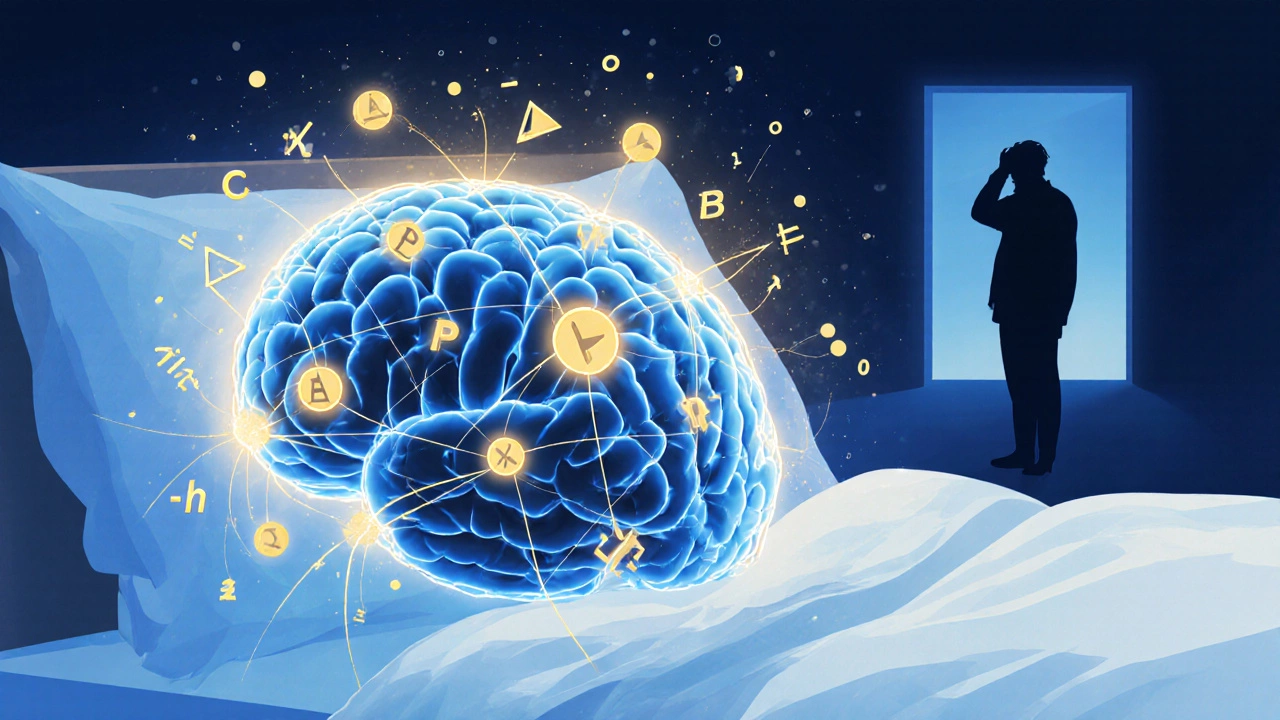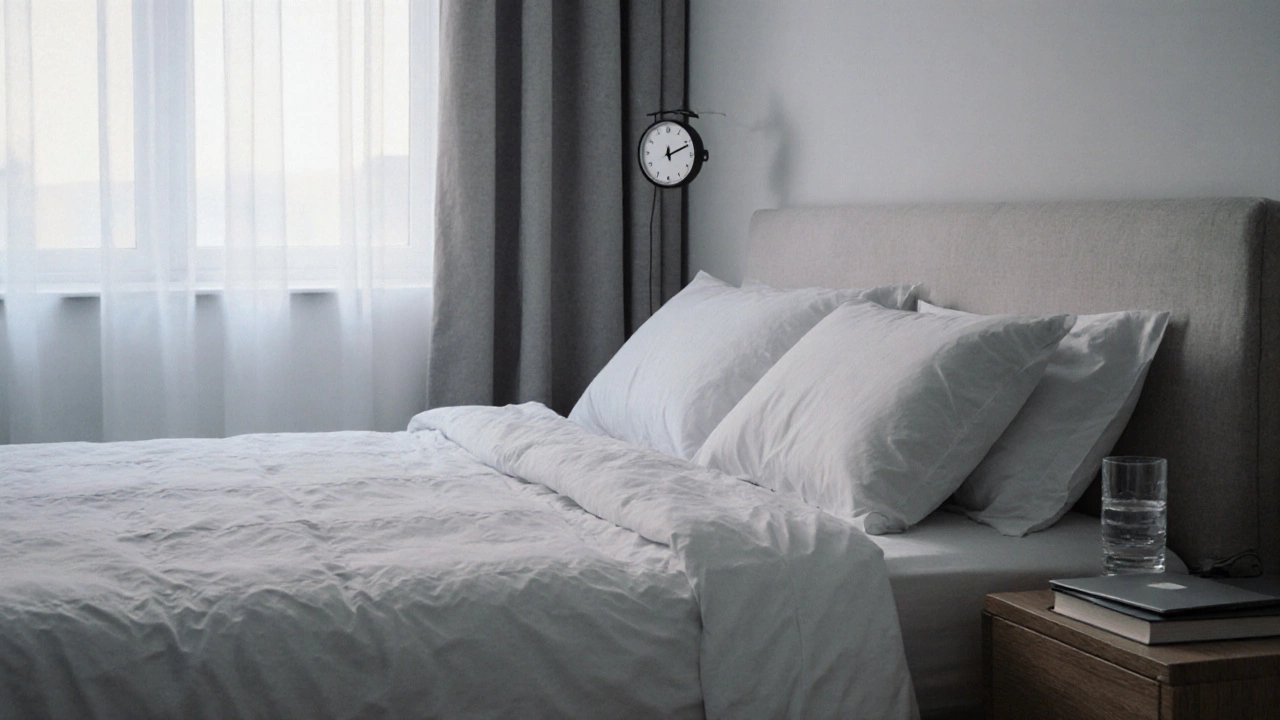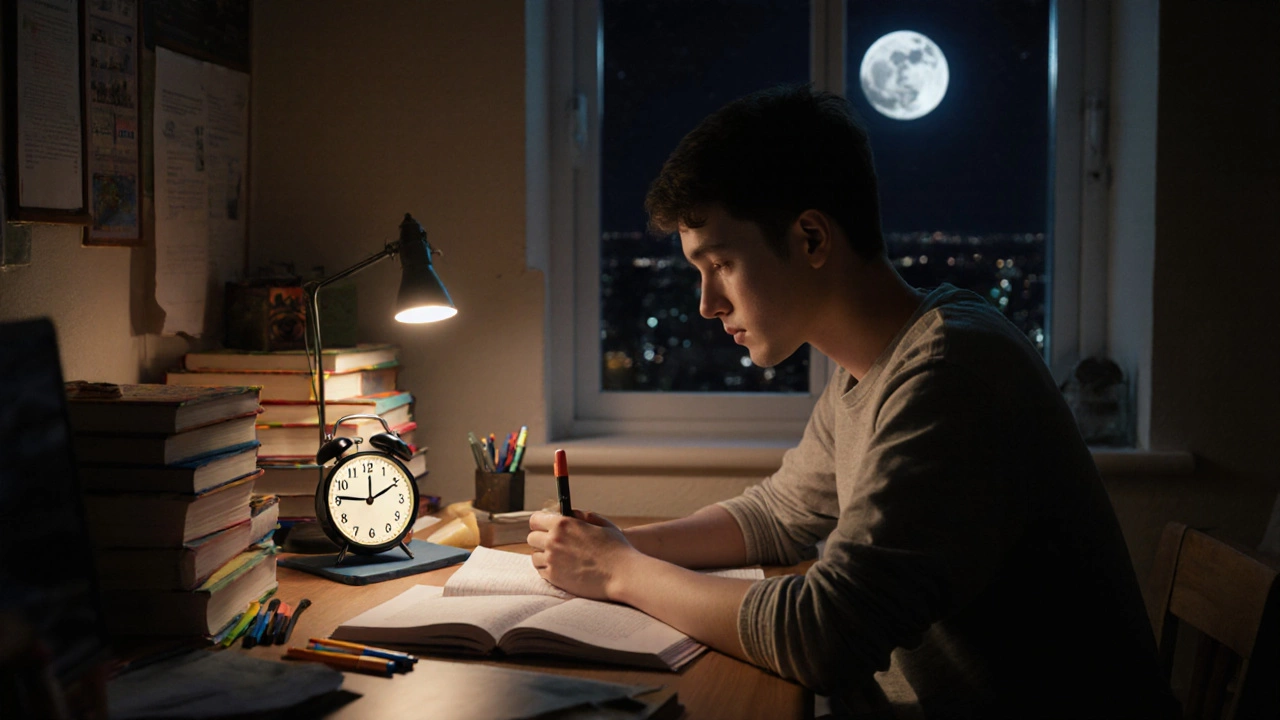JEE Sleep Calculator
Calculate your sleep hours and see if you're meeting the recommended 6.5-7.5 hours for JEE preparation. The right amount of sleep improves focus, memory retention, and problem-solving ability—critical for JEE success.
Most JEE aspirants think they need to sleep less to study more. That’s a myth. The truth? sleep isn’t the enemy of success-it’s the foundation. If you’re pulling 4-hour nights to finish one more mock test, you’re not being smart. You’re burning out. And it’s not just fatigue you’re risking. Your memory, focus, and problem-solving skills all crash when you skimp on rest.
What the Data Actually Shows
A 2024 study by the Indian Institute of Science surveyed over 1,200 JEE Advanced qualifiers. The average sleep duration? 6.5 hours per night. Not 8. Not 4. 6.5. And here’s the kicker: those who slept less than 5 hours had a 40% higher chance of scoring below the top 10,000 rank. Those who slept 7+ hours weren’t lazy-they were strategic.
It’s not about quantity alone. Quality matters. Deep sleep cycles are when your brain consolidates what you learned during the day. If you’re studying trigonometry at 1 a.m. and crashing by 2 a.m., you’re not retaining it. You’re just replaying formulas in your head while half-asleep.
The Myth of the 18-Hour Study Day
You’ve seen those Instagram posts: "18 hours of study, 2 hours of sleep, I cleared JEE!" They’re not inspiring-they’re dangerous. No one survives on 2 hours of sleep for months. Those who claim it are either lying, exaggerating, or got lucky with a naturally high stress tolerance. Most burn out by December.
Top performers don’t study longer. They study smarter. They block time. They take breaks. They sleep. A 2023 analysis of toppers’ routines from Allen, Resonance, and FIITJEE coaching centers showed that the most consistent scorers had 3-4 focused study blocks of 90 minutes each, with 20-minute breaks in between. And they were in bed by 11:30 p.m. every night.
How Sleep Affects Your JEE Performance
Your brain doesn’t just rest when you sleep. It reorganizes. During slow-wave sleep, your hippocampus transfers short-term memories into long-term storage. That complex integration problem you struggled with at 10 p.m.? It gets solved in your sleep. Without enough rest, that connection never forms.
Also, sleep deprivation spikes cortisol-the stress hormone. High cortisol = poor concentration. More mistakes in calculations. Slower reaction time on MCQs. Even small delays in reading questions can cost you marks in a 3-hour exam.
And don’t forget emotional control. Sleep loss makes you irritable. You snap at family. You quit a practice test halfway. You lose motivation. That’s not laziness. That’s your brain screaming for rest.

What a Realistic JEE Sleep Schedule Looks Like
Here’s what works for students who cracked JEE Advanced in 2024:
- Wake up at 6 a.m.-Not 4 a.m. Your body needs morning light to reset your circadian rhythm.
- Study block 1: 7 a.m. - 9:30 a.m.-High-energy time. Tackle tough topics like calculus or electrostatics.
- Break: 9:30 a.m. - 10 a.m.-Walk, stretch, drink water. No phone.
- Study block 2: 10 a.m. - 12:30 p.m.-Practice problems. Use active recall, not passive reading.
- Lunch + nap: 12:30 p.m. - 2 p.m.-A 20-minute power nap boosts afternoon focus. Skip the heavy meal.
- Study block 3: 2:30 p.m. - 5 p.m.-Revise formulas, solve previous year papers.
- Break: 5 p.m. - 6 p.m.-Exercise. Even a 20-minute walk clears mental fog.
- Study block 4: 6:30 p.m. - 8:30 p.m.-Weak areas. Focus on one subject only.
- Dinner + unwind: 8:30 p.m. - 9:30 p.m.-No screens. Read a book. Listen to calm music.
- Sleep by 10:30 p.m. - 11 p.m.-Aim for 7 hours minimum.
This schedule adds up to 7-8 hours of focused study, 7 hours of sleep, and 4-5 hours of recovery. It’s sustainable. It’s repeatable. And it’s what top rankers actually do.
What Happens When You Sacrifice Sleep
Let’s say you start sleeping 5 hours a night in January. By March, you notice:
- You’re missing easy questions because you misread them.
- You forget formulas you memorized last week.
- You feel anxious even during mock tests you used to ace.
- You skip practice papers because you’re too tired to start.
This isn’t "being tough." This is cognitive decline. Your brain is running on fumes. And no amount of caffeine or energy drinks can fix it. Sugar crashes make it worse. You’ll feel wired for 30 minutes, then crash harder.
One student from Kota told me: "I slept 4 hours for two months. I scored 82 in my first mock. I slept 7 hours for the next two. I scored 198. The difference wasn’t more study-it was better rest."

How to Fix Your Sleep If You’re Behind
If you’re currently sleeping 5 hours or less, don’t try to jump to 8 hours overnight. That’s unrealistic. Here’s how to adjust:
- Move bedtime 15 minutes earlier every 3 days.-Start by going to bed at 11:45 instead of 12:15.
- No screens 45 minutes before bed.-Blue light suppresses melatonin. Use a book or paper notes instead.
- Keep a consistent wake-up time-even on weekends.-Your internal clock hates inconsistency.
- Don’t study right before bed.-Finish your last session by 9:30 p.m. Let your brain wind down.
- Use a sleep tracker (optional).-Apps like Sleep Cycle or even your phone’s health app can show you patterns.
Within 2-3 weeks, you’ll notice sharper focus. Fewer mistakes. Better retention. And yes-you’ll still cover the same syllabus. Maybe even faster.
Final Thought: Sleep Isn’t a Reward. It’s a Requirement.
You wouldn’t run a marathon on an empty stomach. You wouldn’t drive 500 km without fuel. So why treat your brain like it runs on willpower alone?
JEE isn’t a test of who can stay awake the longest. It’s a test of who can think clearly under pressure. And clear thinking requires rest.
If you’re serious about cracking JEE, treat sleep like a non-negotiable part of your prep-just like NCERT revision or mock tests. You wouldn’t skip a full-length test. Don’t skip sleep either.
Is 6 hours of sleep enough for JEE preparation?
Yes, 6 hours can be enough if it’s high-quality and consistent. But 7 hours is better. Most top rankers sleep between 6.5 and 7.5 hours. The key isn’t just the number-it’s whether you wake up feeling refreshed. If you’re tired all day, you’re not getting enough rest.
Can I make up for lost sleep on weekends?
Not really. Sleeping 10 hours on Sunday doesn’t undo the damage from 4 hours Monday through Friday. Your brain needs regular, consistent rest. Irregular sleep messes with your circadian rhythm, making it harder to focus during study hours. Stick to a fixed schedule-even on weekends.
Should I take naps during the day?
Yes-if they’re short. A 20-minute nap after lunch can boost alertness and memory retention. But avoid naps longer than 30 minutes-they can leave you groggy and disrupt nighttime sleep. Set an alarm.
Does caffeine affect my sleep during JEE prep?
Yes, badly. Caffeine stays in your system for 6-8 hours. If you drink coffee after 3 p.m., it’s likely keeping you awake. Switch to herbal tea or water in the afternoon. If you need energy, move your body-walk, stretch, do jumping jacks. Movement is a better stimulant than caffeine.
I feel guilty when I sleep. Is that normal?
It’s common-but harmful. Guilt over sleep is a sign of burnout culture, not discipline. Top performers don’t feel guilty. They know rest makes them sharper. Your brain isn’t idle when you sleep. It’s working hard to turn what you studied into long-term knowledge. Sleep isn’t wasted time. It’s the secret weapon.
What if my coaching center expects me to study late?
You don’t have to follow the crowd. Many coaching centers push 12-hour days because they think more hours = better results. But that’s outdated. Focus on your own progress. If you’re improving your mock scores with 7 hours of sleep, stick with it. Your results matter more than what others are doing.
